What is an Air Purifier?
An air purifier is a device designed to remove contaminants from the air in a room. It acts as a silent guardian, diligently working to improve the quality of the air you breathe. These devices come in various shapes, sizes, and purification technologies, catering to different needs and preferences. However, their core function remains the same: to create a healthier and more comfortable living environment.
How do Air Purifiers Work?
Work of Airpurifier
Air purifiers typically employ a fan to draw in the surrounding air. This air is then passed through one or more filters, each designed to target specific types of airborne particles. The purified air is then released back into the room, effectively reducing the concentration of pollutants and creating a cleaner breathing space.
Types of Air Purifiers
HEPA Air Purifiers: High-efficiency particulate air (HEPA) filters are renowned for their ability to capture up to 99.97% of airborne particles as small as 0.3 microns. This includes dust mites, pollen, pet dander, and even some bacteria and viruses.
Activated Carbon Air Purifiers: These purifiers utilize activated carbon filters to absorb odors, gases, and volatile organic compounds (VOCs) that can emanate from everyday items like cleaning products, paints, and furniture.

Who Needs an Air Purifier?
While air purifiers can benefit everyone, they are particularly beneficial for certain individuals who may be more susceptible to the adverse effects of air pollution.
Allergy and Asthma Sufferers
For individuals with allergies or asthma, air purifiers can be life-changing. By removing common allergens like pollen, dust mites, and pet dander, these devices can significantly alleviate allergy symptoms, such as sneezing, coughing, and watery eyes. Additionally, air purifiers can help manage asthma triggers, reducing the frequency and severity of asthma attacks.
Pet Owners
Pet lovers often face the challenge of pet dander, which can trigger allergies and respiratory issues. Air purifiers with HEPA filters effectively capture and remove these microscopic particles, creating a cleaner and more comfortable environment for both pets and their owners.
Individuals with Respiratory Conditions
People with respiratory conditions, such as COPD or emphysema, can experience exacerbated symptoms when exposed to air pollutants. Air purifiers can help improve their indoor air quality by removing irritants that can worsen their condition, allowing them to breathe more easily and comfortably.

The Benefits of Using an Air Purifier
The advantages of incorporating an air purifier into your home or office extend beyond simply removing allergens. These devices offer a range of benefits that can significantly improve your overall well-being.
Improved Indoor Air Quality
Modern homes and offices are often tightly sealed, trapping pollutants and allergens indoors. Air purifiers act as a continuous filtration system, removing these contaminants and improving the overall quality of your indoor air. This is particularly important considering that we spend a significant portion of our lives indoors.
Reduced Allergy and Asthma Symptoms
As mentioned earlier, air purifiers are highly effective in removing common allergens, providing significant relief for allergy and asthma sufferers. By reducing exposure to these triggers, air purifiers can minimize symptoms like sneezing, coughing, wheezing, and difficulty breathing.
Neutralization of Unpleasant Odors
Unwanted odors, whether from cooking, pets, or stale air, can negatively impact the ambiance of your home. Air purifiers equipped with activated carbon filters effectively absorb and neutralize these odors, leaving your living space smelling fresh and clean.
Removal of Harmful Gases and VOCs
Volatile organic compounds (VOCs) are emitted from various sources, including cleaning products, paints, and furniture. These gases can have detrimental effects on health, potentially causing headaches, dizziness, and respiratory problems. Air purifiers with specialized filters can effectively remove these harmful gases, protecting you from their adverse effects.
Enhanced Sleep Quality
A cleaner and healthier breathing environment can directly impact the quality of your sleep. By removing airborne irritants that can disrupt sleep, such as dust mites and allergens, air purifiers can promote sounder and more restful sleep, leaving you feeling refreshed and rejuvenated each morning.
Reduced Risk of Airborne Illnesses
While air purifiers cannot completely eliminate the risk of airborne illnesses, they can significantly reduce the concentration of viruses, bacteria, and other pathogens circulating in the air. This is particularly beneficial during cold and flu seasons, providing an added layer of protection against these contagious illnesses.
Protection Against Environmental Pollutants
In areas with high levels of outdoor air pollution, air purifiers can provide a safe haven by filtering out harmful pollutants, such as smog, smoke, and industrial emissions. This is especially important for individuals with respiratory conditions who are more susceptible to the adverse effects of air pollution.
Improved Cognitive Function
Studies have shown a correlation between improved indoor air quality and enhanced cognitive function. By removing distractions like stale air and unpleasant odors, air purifiers can create a more conducive environment for concentration, focus, and overall cognitive performance.
Protection for Sensitive Individuals
Infants, children, the elderly, and individuals with compromised immune systems are more vulnerable to the negative effects of air pollution. Air purifiers provide an extra layer of protection for these sensitive individuals, creating a healthier and safer indoor environment.

Choosing the Right Air Purifier: Factors to Consider
Navigating the world of air purifiers can be daunting, given the wide variety of options available. Here are key factors to consider when selecting the right air purifier for your specific needs:
Room Size and Coverage Area: Finding the Perfect Fit
The first and most crucial factor is the size of the room or area you want to purify. Air purifiers are designed to handle specific air volumes, typically measured in square feet or cubic meters. Choose an air purifier with a coverage area that matches or exceeds the size of your room for optimal performance.
Filtration Technology: Targeting Specific Pollutants
Consider the specific pollutants you want to target. If allergies and asthma are primary concerns, prioritize a HEPA filter air purifier. If odors and gases are a significant issue, opt for an air purifier with an activated carbon filter. For added protection against microorganisms, consider a model with UV-C light technology.
Clean Air Delivery Rate (CADR): Measuring Purification Efficiency
The Clean Air Delivery Rate (CADR) is a crucial metric that indicates an air purifier’s efficiency in cleaning the air. CADR measures the volume of clean air an air purifier delivers for specific particle sizes (smoke, dust, and pollen). Higher CADR values indicate faster and more efficient air purification.
Noise Level: Creating a Peaceful Environment
Noise level is an important consideration, especially if you’re using the air purifier in a bedroom or other noise-sensitive area. Look for air purifiers with adjustable fan speeds and noise levels to find a balance between performance and quiet operation.
Energy Efficiency: Balancing Performance and Costs
Air purifiers consume energy, so it’s essential to consider their energy consumption. Look for models with energy-saving features like timers, sleep modes, and energy-efficient motors to minimize operating costs.
Maintenance and Filter Replacement: Ensuring Optimal Performance
Air purifier filters require regular replacement to maintain optimal performance. HEPA filters typically last for 6-12 months, while activated carbon filters may need replacement every 3-6 months. Choose an air purifier with clear filter replacement indicators and readily available replacement filters.
Conclusion
Investing in an air purifier is an investment in your health and well-being. From alleviating allergy symptoms to improving sleep quality and protecting against harmful pollutants, the benefits of air purifiers are numerous and far-reaching. By creating a cleaner and healthier breathing environment, these devices contribute to a better quality of life for you and your loved ones.

